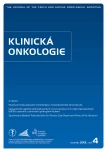-
Medical journals
- Career
Týdenní vs dvoutýdenní aplikace cetuximabu v léčbě metastatického kolorektálního karcinomu – aktuální klinická data
Authors: R. Němeček
Authors‘ workplace: Klinika komplexní onkologické péče, Masarykův onkologický ústav, Brno
Published in: Klin Onkol 2013; 26(4): 291-293
Category: Oncology Highlights
Článek byl podpořen firmou Merck Serono.
Sources
1. Nolting A, Fox FE, Kovar A. Clinical drug development of cetuximab, a monoclonal antibody. In: Meibohm B (ed). Pharmacokinetics and Pharmacodynamics of Biotech Drugs: Principles and Case Studies In Drug Development. Weinheim, Germany: Wiley VCH Verlag GmbH & Co. KGaA 2006 : 353 – 371.
2. Fracasso PM, Burris H 3rd, Arquette MA et al. A phase 1 escalating single‑dose and weekly fixed‑dose study of cetuximab: pharmacokinetic and pharmacodynamic rationale for dosing. Clin Cancer Res 2007; 13(3): 986 – 993.
3. Tabernero J, Ciardiello F, Rivera F et al. Cetuximab administered once every second week to patients with metastatic colorectal cancer: a two‑part pharmacokinetic/ pharmacodynamic phase I dose‑escalation study. Ann Oncol 2010; 21(7): 1537 – 1545.
4. Martin‑Martorell P, Rosello S, Rodriguez ‑ Braun E et al. Biweekly cetuximab and irinotecan in advanced colorectal cancer patients progressing after at least one previous line of chemotherapy: results of a phase II single institution trial. Br J Cancer 2008; 99(3): 455 – 458.
5. Pfeiffer P, Nielsen D, Bjerregaard J et al. Biweekly cetuximab and irinotecan as third‑line therapy in patients with advanced colorectal cancer after failure to irinotecan, oxaliplatin and 5-fluorouracil. Ann Oncol 2008; 19(6): 1141 – 1145.
6. Shitara K, Yuki S, Yoshida M et al. Phase II study of combination chemotherapy with biweekly cetuximab and irinotecan for wild‑type KRAS metastatic colorectal cancer refractory to irinotecan, oxaliplatin, and fluoropyrimidines. Invest New Drugs 2012; 30(2): 787 – 793.
7. Kang MJ, Hong YS, Kim KP et al. Biweekly cetuximab plus irinotecan as secondline chemotherapy for patients with irinotecan ‑ refractory and KRAS wild‑type metastatic colorectal cancer according to epidermal growth factor receptor expression status. Invest New Drugs 2012; 30(4): 1607 – 1613.
8. Jensen BV, Schou JV, Johannesen HH et al. Cetuximab every second week with irinotecan in patients with metastatic colorectal cancer refractory to 5 - FU, oxaliplatin, and irinotecan: KRAS mutation status and efficacy. J Clin Oncol 2010; 28 (Suppl): 7.
9. Bouchahda M, Macarulla T, Liedo G et al. Feasibility of cetuximab given with a simplified schedule every 2 weeks in advanced colorectal cancer: a multicenter, retrospective analysis. Med Oncol 2011; 28 (Suppl 1): S253 – S258.
10. Roca JM, Alonso V, Pericay C et al. Cetuximab given every 2 weeks plus irinotecan is an active and safe option for previously treated patients with metastatic colorectal cancer. Chemotherapy 2010; 56(2): 142 – 146.
11. Brodowicz T, Ciuleanu TE, Radosavljevic D et al. FOLFOX4 plus cetuximab administered weekly or every second week in the first‑line treatment of patients with KRAS wild‑type metastatic colorectal cancer: a randomized phase II CECOG study. Ann Oncol 2013; 24(7): 1769 – 1777.
12. Bokemeyer C, Bondarenko I, Hartmann JT et al. Efficacy according to biomarker status of cetuximab plus FOLFOX ‑ 4 as first‑line treatment for metastatic colorectal cancer: the OPUS study. Ann Oncol 2011; 22(7): 1535 – 1546.
13. Van Cutsem E, Köhne CH, Láng I et al. Cetuximab plus irinotecan, fluorouracil, and leucovorin as first‑line treatment for metastatic colorectal cancer: updated analysis of overall survival according to tumor KRAS and BRAF mutation status. J Clin Oncol 2011; 29(15): 2011 – 2019.
Labels
Paediatric clinical oncology Surgery Clinical oncology
Article was published inClinical Oncology

2013 Issue 4-
All articles in this issue
- Modern Imaging Techniques for Anthracycline Cytostatics – Review of the Literature
- Contemporary Trends of the Adjutant Chemotherapy in Non‑ small Cell Lung Cancer
- Degradation of Proteins by Ubiquitin‑Proteasome Pathway
- Pancreatic Cancer and Lifestyle Factors
- Chromosome Banding Analysis of Peripheral Blood Lymphocytes Stimulated with IL‑2 and CpG Oligonucleotide DSP30 in Patients with Chronic Lymphocytic Leukemia
- Registry of Neuroendocrine Tumors (NET) in Czech Republic After Three Years of Data Collection
- Is the Same Tyrosine Kinase Inhibitor Still Effective After Development of Brain Metastases? A Case Report
- Týdenní vs dvoutýdenní aplikace cetuximabu v léčbě metastatického kolorektálního karcinomu – aktuální klinická data
- Sphere of Surgical Oncology
- Synchronous Bilateral Testicular Germ Cell Tumour: Case Report and Review of the Literature
-
Oncology in Images
Giant Metastatic Testicular Tumor
- Clinical Oncology
- Journal archive
- Current issue
- Online only
- About the journal
Most read in this issue- Registry of Neuroendocrine Tumors (NET) in Czech Republic After Three Years of Data Collection
- Degradation of Proteins by Ubiquitin‑Proteasome Pathway
- Contemporary Trends of the Adjutant Chemotherapy in Non‑ small Cell Lung Cancer
- Chromosome Banding Analysis of Peripheral Blood Lymphocytes Stimulated with IL‑2 and CpG Oligonucleotide DSP30 in Patients with Chronic Lymphocytic Leukemia
Login#ADS_BOTTOM_SCRIPTS#Forgotten passwordEnter the email address that you registered with. We will send you instructions on how to set a new password.
- Career

